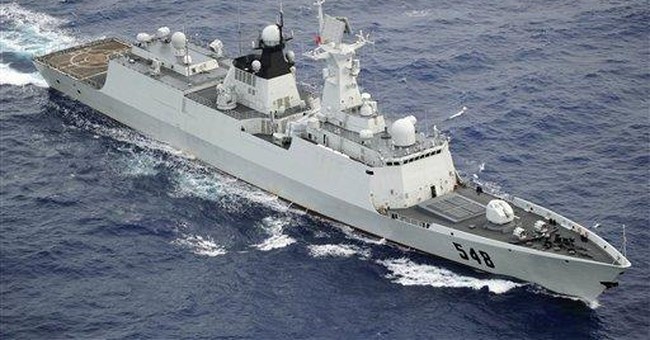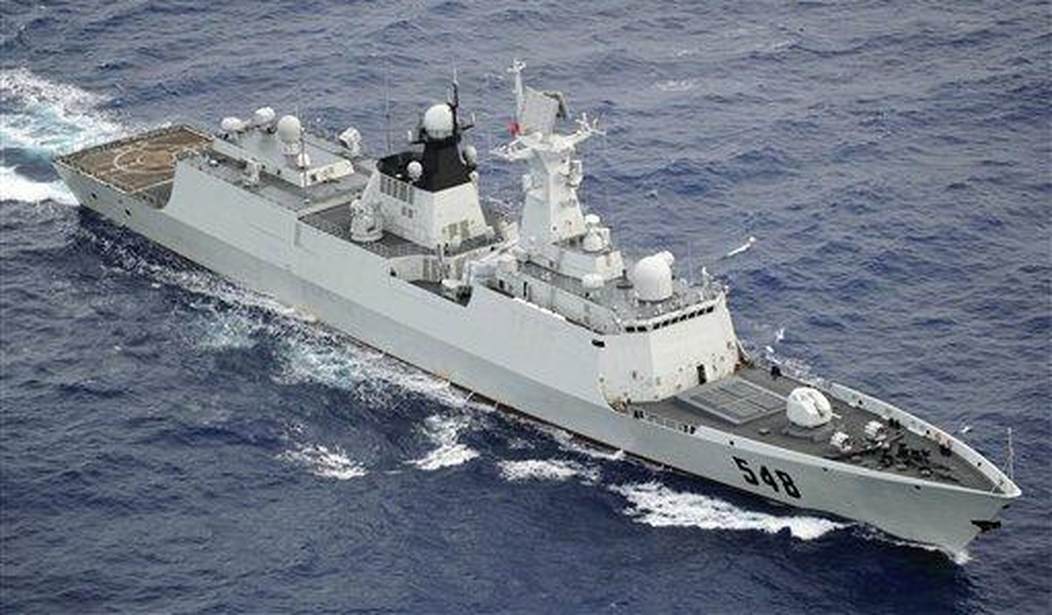
The relationship between the United States and China is a tricky — and complicated — relationship, at best. At worst, according to one senior Republican lawmaker, the two nations could be on a violent collision course in the South China Sea. And soon.
How soon?
As Florida Rep. Ted Yoho, the top Republican on the House Foreign Affairs subcommittee for Asia, told the Washington Examiner, within a matter of months.
While U.S.-China competition has so far played out in the global economic arena and between the countries’ respective spy agencies, Yoho thinks it could soon result in a military clash, as China seeks to tighten control of the shipping lanes around its borders — mostly importantly in the South China Sea.
“I would predict there will be a clash within the next three to six months. Knowing China, I think what they would do is ram one of our ships and say it was a mistake.”
Yoho said sinking a U.S. warship would be a “huge” mistake for China, but he thinks they would risk it. “People will die,” he said.
“To sink a carrier would be a huge mistake, to attack any of our ships would be a huge mistake, but I think they’re willing to risk that to test the waters. And unfortunately, people will die. It would just be a mistake if they did that, for them.”
As Washington Examiner noted, Yoho’s prediction comes as U.S. intelligence officials assess that the Chinese Communist government is waging a “cold war” against Washington. China’s handling of the Wuhan virus, along with its tightening grip on Hong Kong, have only served to exacerbate tensions between the two superpowers.
Additionally, the U.S. has long been concerned over China’s activities in the international waters of the South China Sea — which China claims are its territorial waters —including the construction of artificial islands.
In a 2015 report titled “What China Has Been Building in the South China Sea,” The New York Times provided an update on China’s progress in “rapidly piling sand onto reefs in the sea, creating seven new islets in the region,” adding that the ongoing construction on the reefs was “straining geopolitical tensions that were already taut.”
The speed and scale of China’s island-building spree have alarmed other countries with interests in the region. China announced in June that the creation of islands — moving sediment from the seafloor to a reef — would soon be completed. Since then, China has focused its efforts on construction.
So far it has constructed port facilities, military buildings and an airstrip on the islands, with recent imagery showing evidence of two more airstrips under construction. The installations bolster China’s foothold in the Spratly Islands, a disputed scattering of reefs and islands in the South China Sea more than 500 miles from the Chinese mainland.
China’s activity in the Spratlys is a major point of contention between China and the United States and was a primary topic of discussion between President Obama and President Xi Jinping of China during the Chinese president’s visit to the White House in September.
Obama, far more interested in “fundamentally changing America,” stood by, in effect, as China completed the construction. Then again, “Red Line” Obama never was very good at following through after warning America’s adversaries against hostile acts (see “Syrian Dictator Bashar al-Assad, chemical weapons.”), but I digress.
U.S. warships have regularly challenged the Communist government’s claims to the South China Sea, most recently in early July. As reported by the Wall Street Journal:
The U.S. is sending two aircraft carriers into one of Asia’s hottest spots to deliver a pointed message to China that it doesn’t appreciate Beijing’s military ramp-up in the region.
The USS Ronald Reagan and USS Nimitz are set to hold some of the U.S. Navy’s largest exercises in recent years in the South China Sea from Saturday—at the same time that China is holding drills in the area.
China’s incremental encroachments have collectively changed the South China Sea's geopolitical map. It was on Obama's watch that China built artificial islands and militarized them. Now, China is broadening its expansionism—from Hong Kong to India border. https://t.co/g0J5uwnzXx
— Brahma Chellaney (@Chellaney) July 4, 2020
The Diplomat reported on July 6 that the operations were meant to “support a free and open Indo-Pacific,” according to the U.S. Navy.
The USS Ronald Reagan and USS Nimitz carrier strike groups carried out operations and exercises in the South China Sea on Saturday, according to the U.S. Navy. The operations were meant to “support a free and open Indo-Pacific,” the U.S. Navy said. It did not specify the location of the exercises.
“The purpose is to show an unambiguous signal to our partners and allies that we are committed to regional security and stability,“ said Admiral George M. Wikoff, who spoke to the Wall Street Journal about the exercises.
[…]
The exercises mark the first time the U.S. Navy has conducted such exercises in the South China Sea with two aircraft carriers.
Whether or not Ted Yost was correct in his prediction of a coming military clash between the U.S. and China, the contentious relationship between the two adversaries stands as one more critical reason for voters to contrast the differences between Donald Trump and Joe Biden, as the November election edges closer and closer.
From stiff tariffs on Chinese imports, to holding China accountable for the COVID-19 pandemic, Trump has by and large been consistent with his approach to the Communist government in Beijing.
In contrast, just last year, shortly after announcing his candidacy, an out-of-touch Biden scoffed at the idea that China presents an economic threat to America — or ever will.
“China is going to eat our lunch? Come on, man. They can’t figure out how they’re going to deal with the corruption that exists within the system. I mean, you know, they’re not bad folks. But guess what? They’re not competition for us.”
With less than four months until “go time” for America’s voters, we face perhaps the most important presidential election in a generation. Yes, we’ve been saying that, every four years, for at least a generation. But somehow, this time, it feels like it’s for keeps.













Join the conversation as a VIP Member